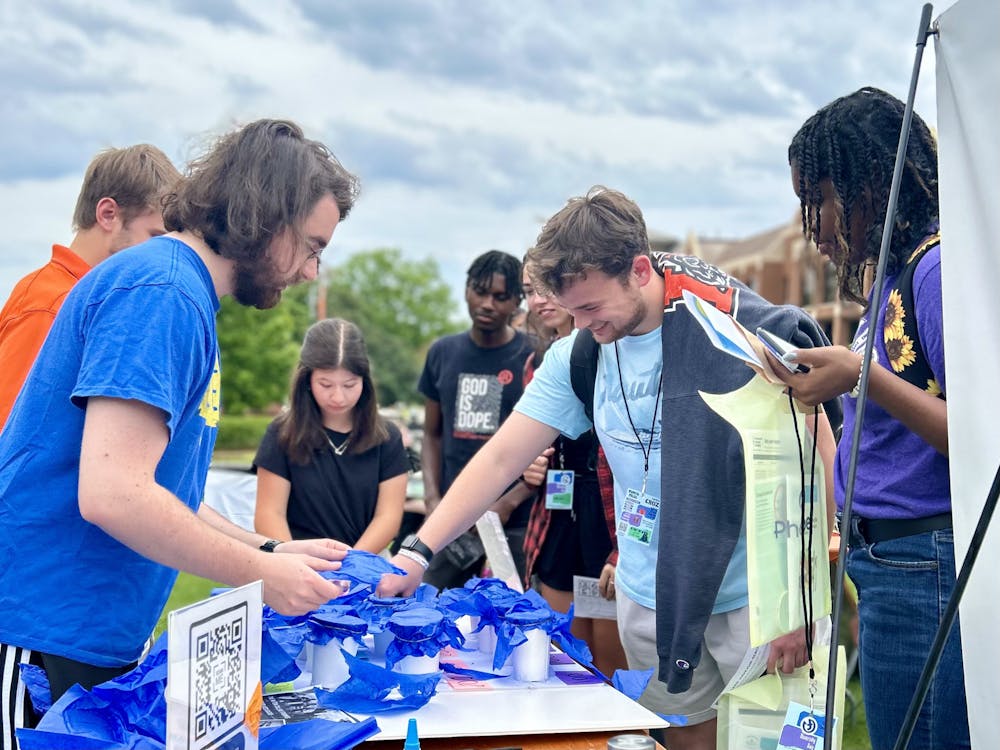Mercer students visited over a dozen booths on Cruz Plaza Wednesday for Mercer's first "Fresh Check Day," a new initiative organized by Counseling and Psychological Services (CAPS). The event provided student organizations with a platform to promote mental health awareness on Mercer's campus.
Fresh Check Day was created in partnership with the Jordan Porco Foundation, an organization founded in honor of Jordan Porco, who died by suicide during his first year of college. His parents wanted to help fill the widening gap in the mental health care system specifically for young adults by putting on programs across college campuses nationwide.
Shun Kell, assistant director of CAPS, organized the event. The catalyst for Fresh Check Day came after he spoke with Dean Doug Pearson, university vice president and dean of students. Pearson challenged him to come up with ways to increase awareness about suicide prevention on campus.
“He [Pearson] didn't want to check a box, he wanted it to be meaningful,” Kell said.
Kell researched evidence-based methods listed by The Society for Prevention and Research for Suicide and came across Fresh Check Day.
“It is peer-to-peer; people in college want to hear from each other rather than someone their dad's age. By empowering students to deliver the message, the general student body is more inclined to listen,” Kell said.
On Cruz, student organizations manned interactive booths and distributed facts, prizes and help guides and suggested ways to incorporate wellness into student life at Mercer.
One of these booths was created by MerServe, a club that works to build and strengthen connections between the Mercer and Macon communities through service projects. At Fresh Check Day, Iquadine Osbourne ‘24 was able to share how being a part of community service can benefit one's mental health.
“We are trying to build a community," Osbourne said. "When you volunteer, you meet people and you meet friends so you get that community that will help you get through your four years here. ”
A Gallup Purdue Index report studied over 30,000 college graduates in the United States to understand how higher education institutions help students pursue not only successful careers but also productive lives. The report identified five areas of well-being for college students: purpose, social, financial, community and physical.
It explained how students' experiences on campus can impact their engagement in future jobs and overall life satisfaction. The study concluded that students who thrive in all five areas of well-being have double the chance of success in their careers and personal lives.
Mercer’s Pre-Health Honor Society (MU AED) and Health Occupations Students of America (HOSA) also took on the initiative to spread awareness about wellness at their booth by having a life-sized game of operation. Arsha Moorthy ‘24, president of MU AED, shared that Fresh Check Day allowed her organization to inform students about the intersection between physical and mental health. Students were able to interact with the game and learn how different parts of the body connect to one's mental health.
“We want to promote that mental health and physical health are connected and they both are equally important because that's something society frowns upon and not taken seriously," Moorthy said.
Mercer University ROTC and At Ease were present on Cruz raising awareness of how student veterans who experienced deployment can struggle with mental wellbeing and how peers and their families can help and advocate throughout the transition. Nathaneal Barrow '26, a graduate student at Mercer University, explained how mental health and helping student veterans is important.
“The things that happen to veterans after service tend to be very misunderstood," Barrow said. "They are affected with issues like PTSD, major depression, and re-orienting themselves after serious trauma. We just want to raise awareness on that and how to help."
According to the Youth Risk Behaviors Survey (YRBS), in the United States, 1,100 college students between the ages of 18 and 24 commit suicide every year and almost 24,000 attempt it. In 2021, 22% of college students had considered attempting suicide.
If you or someone you know is struggling, consider reaching out to the 988 Suicide and Crisis Lifeline (formerly known as the National Suicide Prevention Lifeline). The new 3-digit number, 988, is as easy to remember as 911.
Additionally, there are specialized hotlines for specific populations:
Trans Lifeline (877-565-8860): Offers peer support and advocacy for the trans community and LGBTQ+ youth
Physician Support Line (888-409-0141): Provides peer support to medical students and physicians, who faced a higher risk of suicide even before the intense stressors of the Covid-19 pandemic
Kiva Centers (508-751-9600): Offers daily online peer support groups
Project LETS (401-400-2905): Provides support by text for urgent issues that involve involuntary hospitalization
Alisha Mitchell '26 is majoring in Journalism and Political Science at Mercer University. She is a part of the Student Government Association and works for Mercer’s Undergraduate Admissions office. Alisha is highly involved on campus and loves writing for The Cluster. When she isn't writing or working, she enjoys sitting outside in nature or thrifting with friends.





